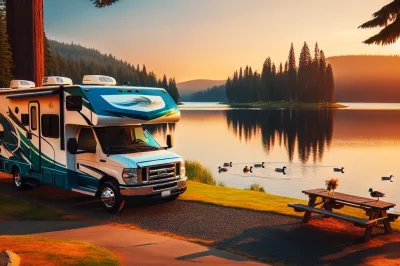Table of Contents

Your Guide to Picking the Perfect RV Solar Battery Charger
Embarking on the open road in your RV means freedom, adventure, and… the need for reliable power. Whether you’re boondocking in the wilderness or parked at a campsite, a robust solar battery charger is your ticket to energy independence. Let’s get you set up with the right one.
Key Takeaways
- Understanding the basics of RV solar battery chargers is key to choosing the right one.
- Going solar with your RV means clean energy and cost savings in the long run.
- Match your solar charger to your specific power needs to avoid over- or under-charging.
- Assess your RV’s power consumption to determine the size and type of charger you need.
- Look at the specifications of solar chargers to ensure they meet your RV’s requirements.
Understanding Solar Battery Chargers for RVs
Before we get into the nuts and bolts, it’s important to grasp what a solar battery charger is. Simply put, it’s a device that converts sunlight into electrical energy, which is then used to charge your RV’s batteries. This process allows you to store power for use when the sun isn’t shining.
What Are RV Solar Battery Chargers?
- Devices that convert solar energy into electricity to charge RV batteries.
- Typically include solar panels, a charge controller, and necessary wiring.
- Can be portable or permanently mounted on your RV.
- Environmentally friendly and cost-effective over time.
- Essential for off-grid camping and long road trips.
Solar battery chargers for RVs come in various shapes and sizes, but they all have one goal: to keep you powered up without a traditional power hookup. They’re particularly handy for those who love to explore remote areas where plugging into the grid isn’t an option.
Why Go Solar for Your RV?
Switching to solar isn’t just a trend; it’s a smart move for any RV owner. Solar power is clean, renewable, and once you’ve made the initial investment in a solar charger, the sun’s energy is absolutely free. Plus, it’s a quiet power source that won’t disturb the peace of nature around you.
But the benefits don’t stop there. With solar power, you’re not at the mercy of fluctuating fuel prices, and you reduce your carbon footprint, making your RV travels more sustainable. It’s a win-win for both your wallet and the planet.

Matching Chargers with Your RV Needs
Your RV is as unique as your travel itinerary, and so are its power needs. To find the perfect solar battery charger, you need to consider how much power you use on a typical day on the road. This will ensure you have enough juice to keep all your gadgets and appliances running smoothly.
Assessing Your RV’s Power Consumption
Start by making a list of all the electrical devices you use in your RV, from lights and refrigerators to TVs and laptops. Note how many watts each item uses and how long you typically use them each day. Add it all up, and you’ll have a rough estimate of your daily power consumption.
Remember, it’s better to overestimate a little to ensure you’re covered on those days when you use a bit more power than usual. Having this information at your fingertips will make choosing the right charger much easier.
Analyzing Solar Charger Specifications
Now that you know your power needs, it’s time to look at what the solar chargers offer. Pay close attention to the wattage rating—it should meet or exceed your RV’s daily power consumption. Also, check the voltage compatibility to ensure it matches your RV’s battery system.
It’s not just about the numbers; quality matters too. Look for chargers made from durable materials that can withstand the rigors of the road and changing weather conditions. A good warranty can also give you peace of mind, knowing you’re covered if anything goes wrong.
With these insights, you’re well on your way to choosing a solar battery charger that will keep your adventures bright, day and night. Stay tuned for more detailed guidance on finding the perfect match for your RV’s energy needs.
Charging Capacities and Controller Types
Charging capacity is like the fuel tank of your solar power system: it determines how much energy you can store for later use. It’s crucial to match the charger’s capacity with your RV’s energy demands to ensure you never run out of power when you need it most.
Solar Charger Output: What You Need to Know
The output of a solar charger is measured in watts, and it dictates how quickly your batteries can be charged. If you have a high energy demand, you’ll need a charger with a high wattage output. But if your energy needs are modest, a lower wattage charger will do the job without draining your wallet.
Keep in mind that solar energy isn’t always consistent – it varies with the weather and the time of day. So, it’s wise to choose a charger that can handle a bit more than your estimated power usage. This way, even on cloudy days, you can still gather enough power to meet your needs.
Choosing Between MPPT and PWM Controllers
When it comes to solar charge controllers, you’ll come across two main types: Maximum Power Point Tracking (MPPT) and Pulse Width Modulation (PWM). Here’s the lowdown on each:
- MPPT: These are the high-efficiency controllers. They adjust their input to harvest the maximum power from the solar panels, even during less than ideal lighting conditions. They’re perfect for larger systems and can improve efficiency by up to 30%.
- PWM: These are more common and cost-effective. They work well in smaller systems and are great for those just starting with solar power. However, they’re not as efficient as MPPT controllers, especially in fluctuating weather conditions.
Choosing the right controller is essential for optimizing your solar power system’s performance. MPPT controllers are generally the better choice if your budget allows, but PWM controllers can still provide reliable service for smaller setups.

The Importance of Battery Compatibility
Not all batteries are created equal, and the same goes for solar chargers. To get the most out of your solar power system, you need to ensure that your charger is compatible with the type of batteries you have in your RV.
Compatibility with Battery Types
There are several types of batteries used in RVs, including lead-acid, AGM, gel, and lithium. Each has its own charging requirements:
- Lead-Acid: These are the traditional choice and need regular maintenance, including water top-ups.
- AGM and Gel: These are maintenance-free and more resistant to cold temperatures, but they require specific charging voltages to prevent damage.
- Lithium: These are the new kids on the block, offering longer lifespans and higher efficiency. They need a charger that can provide a higher voltage and more precise charging.
Make sure your solar charger is designed to work with your specific battery type. Using the wrong charger can reduce the lifespan of your batteries or even damage them.
Understanding Charger and Battery Capacity
Capacity is all about balance. Your solar charger and battery capacities should be closely aligned. If your charger’s capacity is too low, it won’t be able to fully charge your batteries, leaving you without enough power. If it’s too high, you might be wasting potential charging power.
As a rule of thumb, your solar charger should be able to provide about 10% of your battery’s capacity in amp-hours. So, for a 100 amp-hour battery, look for a charger that can provide around 10 amps per hour.
Installation and Portability
When you’re living the RV life, flexibility is key. Your solar charger should not only meet your power needs but also fit your lifestyle. That means considering how easy it is to install and whether you want a fixed or portable system.
Ease of Charger Installation
Installing a solar charger doesn’t have to be a headache. Many chargers come with easy-to-follow instructions and can be set up without professional help. Look for systems with plug-and-play components, clear labeling, and strong customer support from the manufacturer in case you hit a snag.
However, if you’re not comfortable with DIY electrical work, it’s wise to hire a professional. A properly installed system will be more efficient, safer, and often comes with the added benefit of a professional’s expertise to ensure everything is set up perfectly for your specific needs.
Portable vs. Fixed Solar Chargers
Choosing between a portable and a fixed solar charger is like picking between a tent and an RV – both have their place, depending on your lifestyle. Portable chargers are great for those who like to chase the sun, offering the flexibility to move your panels throughout the day for maximum exposure. They’re also a good choice if you’re testing the waters of solar power before making a permanent installation.
Fixed chargers, on the other hand, are all about convenience. Once installed, they’re always working, collecting solar energy while you drive or relax. They tend to be more robust and can be installed in optimal positions on your RV’s roof, making the most of the available sunlight.
Your choice will depend on how you use your RV. If you’re constantly on the move and love to optimize every detail, a portable charger might be your best bet. But if you prefer a ‘set it and forget it’ approach, then a fixed system will serve you well.

Quality and Reliability
When it comes to solar chargers, quality and reliability aren’t just buzzwords – they’re essentials. A solar charger is an investment in your RV lifestyle, and you want one that’s going to stand the test of time and the challenges of the road.
Materials and Durability
The materials used in your solar charger can make a huge difference in its longevity. Look for high-quality, UV-resistant panels that can handle the harsh rays of the sun day after day. The frame and mounting hardware should be corrosion-resistant – think aluminum or stainless steel – to withstand the elements.
Durability also extends to the wiring and connectors. They should be thick enough to handle the electrical load and insulated to protect against weather and wear. A rugged build means fewer worries about repairs and replacements down the line.
Manufacturer Warranty and Support
A manufacturer’s warranty is like a safety net for your solar charger. It shows that the company stands behind its product and is willing to support you if things go wrong. Look for warranties that cover a significant period – at least a few years – and pay attention to what’s included.
Support is just as important. A responsive customer service team can be a lifesaver when you’re dealing with installation questions or troubleshooting issues. Check out reviews and ask other RVers about their experiences with the manufacturer’s support before you buy.
Additional Features and Accessories
While the core components of your solar charger are non-negotiable, additional features and accessories can enhance your solar power experience. These extras can make your system more efficient, easier to use, and more suited to your unique RV lifestyle.
Must-Have Features for Optimal Charging
- An integrated battery management system to protect against overcharging and extend battery life.
- LED indicators or a digital display for monitoring charge levels and system status at a glance.
- Multiple charging ports to handle different types of devices simultaneously.
- Adjustable settings that allow you to tailor the charging process to your specific battery type.
- Weatherproofing features to keep your system running in all conditions.
These features can make the difference between a good solar charging experience and a great one. They add layers of convenience and control that can help you make the most of the sun’s power.
Useful Accessories for Solar Charging Systems
- Extension cables for added flexibility in where you position your portable panels.
- Mounting brackets that allow for easy installation and optimal angling of fixed panels.
- A carrying case for portable panels to protect them during storage and transport.
- An inverter to convert DC power from your batteries to AC power for household devices.
- Connectors and adapters for compatibility with various devices and battery types.
Accessories can provide the finishing touches that tailor your system to your needs. They’re the difference between using your solar charger and loving it.
Cost Considerations
Let’s talk money. Solar chargers range from budget-friendly to high-end, and it’s important to find the sweet spot between cost and quality. Cheap chargers might be tempting, but they can end up costing more in the long run if they fail when you need them most.
When considering cost, don’t just look at the price tag. Think about the value over time. A more expensive charger with a robust warranty, durable materials, and efficient performance can save you money on replacements and repairs down the road.
Also, factor in the potential savings on campground fees and generator fuel. Over time, a solar charger can pay for itself with the free and clean energy it provides. It’s an investment in a greener, more sustainable RV lifestyle.
Choosing the right RV solar battery charger might seem daunting, but with the right knowledge and a clear understanding of your needs, you can make an informed decision. Remember, the best charger for you is the one that meets your power needs, fits your budget, and matches your RV lifestyle. With the sun as your fuel source, the road is yours to explore.
Finding Value: Balancing Cost and Quality
When you’re weighing the options for your RV’s solar battery charger, it’s like balancing on a tightrope. On one side, you’ve got cost, and on the other, quality. Lean too far towards saving money upfront, and you might end up with a charger that doesn’t last. Tip too much towards quality, and your wallet might feel the pinch. The key is to find a charger that offers the best of both worlds: a reasonable price for a system that’s built to last and perform well.
It’s smart to invest in a charger with a solid warranty, reliable customer support, and a track record of performance. These factors often point to a quality product that may cost a bit more but will offer better value over time. Remember, a solar charger is an investment in your RV lifestyle, and the right choice will pay off in the long run.
Long-Term Savings with Solar Chargers
Think of a solar battery charger as a piggy bank. Every ray of sunshine it catches is like dropping a coin into your savings. Over time, those coins add up. Sure, the initial cost might be more than a traditional generator, but solar chargers have virtually no running costs. No fuel to buy, no parts to replace regularly, and they’re kinder to the environment.
What’s more, they can increase the value of your RV. A top-notch solar setup can be a major selling point if you ever decide to upgrade your home on wheels. Plus, the freedom to camp off-grid can save you heaps on campsite fees. In the long haul, a solar charger can help you save a bundle.
Trusted Brands and User Reviews
When you’re picking a solar battery charger, you’re not just buying a product; you’re joining a community. The best brands aren’t just selling chargers; they’re offering peace of mind and a promise of adventure. They stand by their products with strong warranties and responsive customer service.
Top Brands in RV Solar Battery Chargers
Some brands have earned their stripes on the road, trusted by RVers far and wide. Brands like Renogy, Go Power!, and Victron Energy are known for their quality and reliability. They offer a range of products to suit different needs and budgets, and they’re backed by solid warranties and excellent customer support.
Renogy, for instance, is praised for its user-friendly kits that make solar power accessible to beginners. Go Power! is known for its durable, high-efficiency panels, and Victron Energy stands out with its smart solar charge controllers that offer detailed system monitoring.
Learning from User Experiences
Before you make your choice, listen to the stories of those who’ve been where you are now. User reviews can be a goldmine of information. Look for patterns in the feedback – are there certain issues that come up again and again? How does the company handle customer complaints?
And it’s not just about the negatives. Positive reviews can tell you what a brand is doing right and what you can expect from their products. User stories can also give you real-world insights into how the charger performs under different conditions.
Making the Right Choice
Choosing the right solar battery charger for your RV is a big decision, but it doesn’t have to be overwhelming. With the information you’ve gathered, you’re well-equipped to make a choice that will keep your lights on and your adventures rolling.
Putting It All Together: Your Ideal Solar Battery Charger
Your ideal solar battery charger is the one that ticks all the boxes for your RV lifestyle. It should match your power needs, be compatible with your batteries, and fit within your budget. It should be from a brand with a reputation for quality and backed by good customer support. And, it should come with the features and accessories that make solar power easy and efficient for you.
Take your time, compare options, and don’t be afraid to ask questions. The right charger is out there, and with a bit of research, you’ll find it.
When to Consult with a Solar Power Expert
If you’re still unsure or if your setup is more complex, it’s a good idea to consult with a solar power expert. They can help you navigate the finer points of solar power and ensure that your system is perfectly tailored to your needs. They’ll take into account factors like your travel habits, the climate you typically camp in, and the specifics of your RV.
Experts can also help with the installation, making sure everything is safe and up to code. Their knowledge can be invaluable, saving you time, money, and headaches in the long run. So, if you’re feeling out of your depth, reach out to a pro. They’re the co-pilots you need on your journey to solar-powered freedom.
FAQs
How do I determine the right size solar battery charger for my RV?
To figure out the right size solar battery charger, you need to calculate your daily power usage. List all the devices you use, note their wattage, and how long you use them each day. Add up the total wattage hours and then aim for a solar charger that can produce that amount of power in about 5-6 peak sunlight hours. This ensures you have enough energy even on days when the sun isn’t at its strongest.
Can I charge lithium batteries with any solar charger?
Not all solar chargers are suitable for lithium batteries. Lithium batteries require a specific charging profile to maintain their health and longevity. Make sure to choose a solar charger that specifies it’s compatible with lithium batteries and can provide the appropriate voltage and charging stages required for safe and efficient charging.
Are portable solar chargers as effective as fixed installations?
Portable solar chargers can be just as effective as fixed installations, but their efficiency depends on how you use them. They need to be positioned correctly to capture maximum sunlight, which may require manual adjustment throughout the day. Fixed installations, on the other hand, are set up to capture sunlight throughout the day without needing to be moved. The choice between the two often comes down to personal preference and camping style.
What is the difference between MPPT and PWM solar charge controllers?
MPPT (Maximum Power Point Tracking) controllers are more efficient than PWM (Pulse Width Modulation) controllers, especially in varying weather conditions. MPPT controllers can convert excess voltage into amperage, which results in faster charging and can extract more power from your solar panels. PWM controllers are simpler and less expensive but are best suited for smaller systems where efficiency is less of a concern.
How can I ensure my solar charger is durable and long-lasting?
To ensure your solar charger lasts, choose one with high-quality components and a solid warranty. Look for durable, weather-resistant materials, and robust construction. Proper installation and regular maintenance will also extend the life of your solar charger. Keep an eye on the wiring and connections, and clean your solar panels regularly to ensure they’re performing at their best.
With the right information and a bit of planning, you can harness the power of the sun to keep your RV running smoothly wherever your travels take you. A solar battery charger is a smart investment that pays off in freedom, savings, and peace of mind. So, take your time, do your homework, and choose the charger that’s right for you. The road is calling, and with solar power, you’re ready to answer.
- Boondocking RVs: Flexible Solar Solutions – 3 March 2024
- Renewable Energy Tips for Full-Time Boondocking RVers – 2 March 2024
- Boondocking Solar Power Systems: Sizing Options & Solutions for Motorhomes – 1 March 2024
